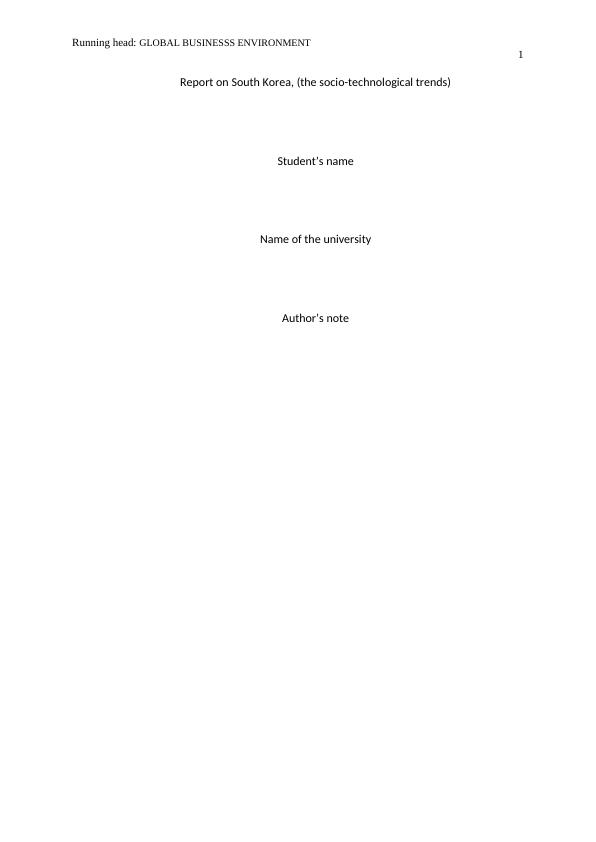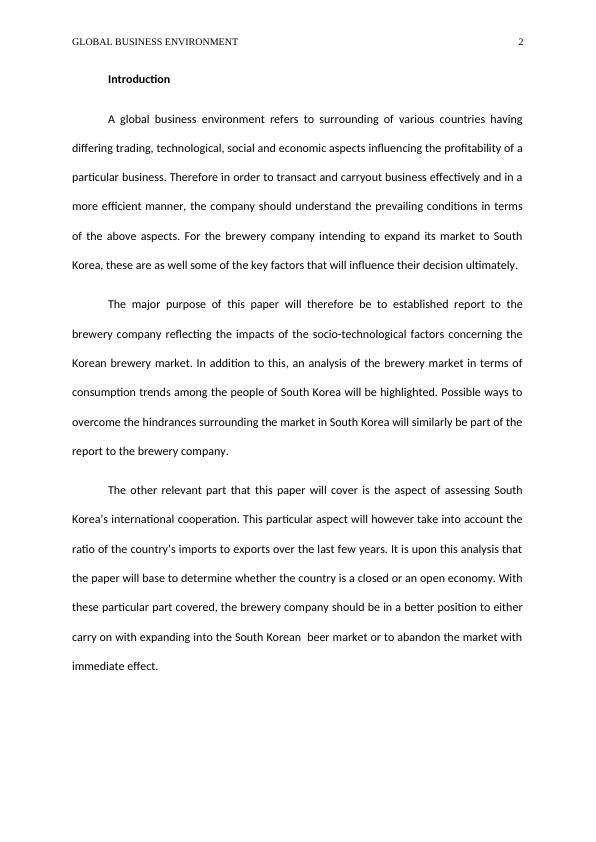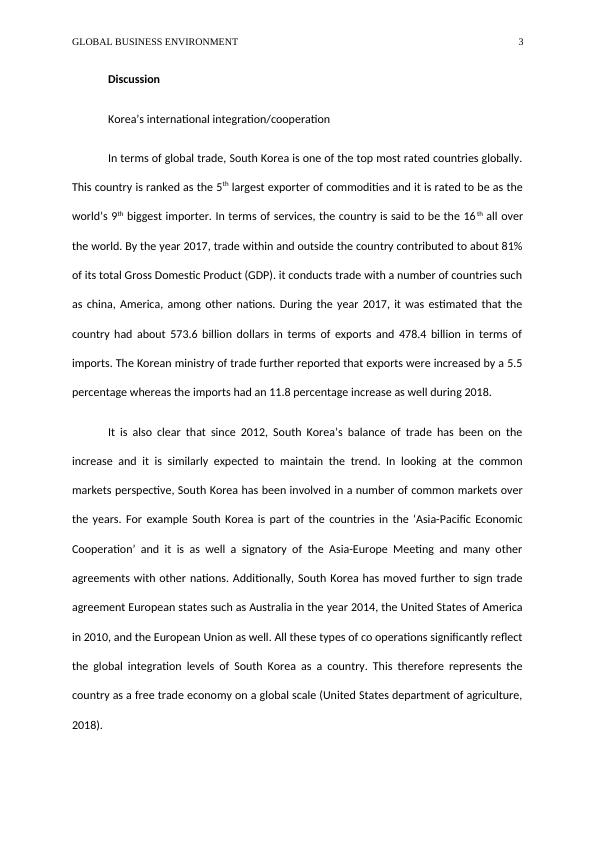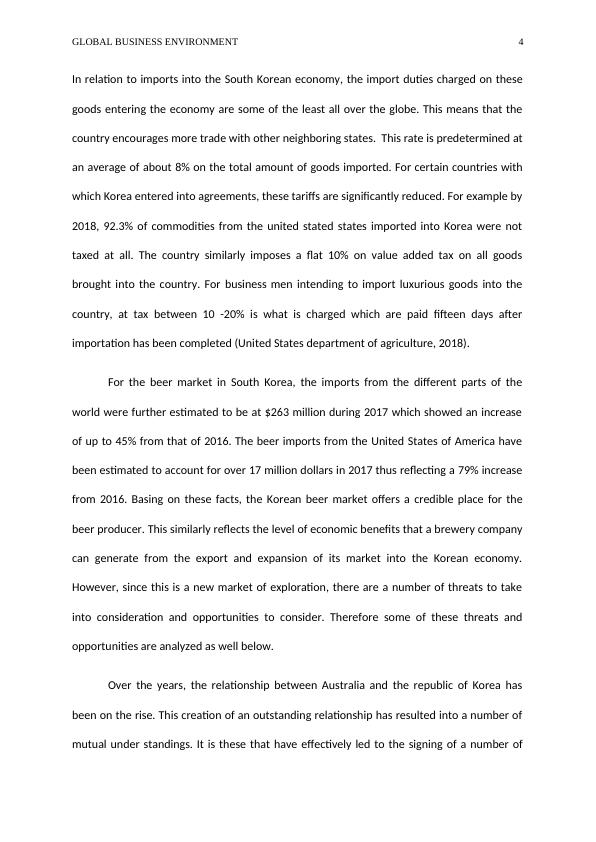Report on South Korea, (the socio-technological trends)
Added on 2023-03-21
13 Pages3483 Words36 Views
Running head: GLOBAL BUSINESSS ENVIRONMENT
1
Report on South Korea, (the socio-technological trends)
Student’s name
Name of the university
Author’s note
1
Report on South Korea, (the socio-technological trends)
Student’s name
Name of the university
Author’s note

GLOBAL BUSINESS ENVIRONMENT 2
Introduction
A global business environment refers to surrounding of various countries having
differing trading, technological, social and economic aspects influencing the profitability of a
particular business. Therefore in order to transact and carryout business effectively and in a
more efficient manner, the company should understand the prevailing conditions in terms
of the above aspects. For the brewery company intending to expand its market to South
Korea, these are as well some of the key factors that will influence their decision ultimately.
The major purpose of this paper will therefore be to established report to the
brewery company reflecting the impacts of the socio-technological factors concerning the
Korean brewery market. In addition to this, an analysis of the brewery market in terms of
consumption trends among the people of South Korea will be highlighted. Possible ways to
overcome the hindrances surrounding the market in South Korea will similarly be part of the
report to the brewery company.
The other relevant part that this paper will cover is the aspect of assessing South
Korea’s international cooperation. This particular aspect will however take into account the
ratio of the country’s imports to exports over the last few years. It is upon this analysis that
the paper will base to determine whether the country is a closed or an open economy. With
these particular part covered, the brewery company should be in a better position to either
carry on with expanding into the South Korean beer market or to abandon the market with
immediate effect.
Introduction
A global business environment refers to surrounding of various countries having
differing trading, technological, social and economic aspects influencing the profitability of a
particular business. Therefore in order to transact and carryout business effectively and in a
more efficient manner, the company should understand the prevailing conditions in terms
of the above aspects. For the brewery company intending to expand its market to South
Korea, these are as well some of the key factors that will influence their decision ultimately.
The major purpose of this paper will therefore be to established report to the
brewery company reflecting the impacts of the socio-technological factors concerning the
Korean brewery market. In addition to this, an analysis of the brewery market in terms of
consumption trends among the people of South Korea will be highlighted. Possible ways to
overcome the hindrances surrounding the market in South Korea will similarly be part of the
report to the brewery company.
The other relevant part that this paper will cover is the aspect of assessing South
Korea’s international cooperation. This particular aspect will however take into account the
ratio of the country’s imports to exports over the last few years. It is upon this analysis that
the paper will base to determine whether the country is a closed or an open economy. With
these particular part covered, the brewery company should be in a better position to either
carry on with expanding into the South Korean beer market or to abandon the market with
immediate effect.

GLOBAL BUSINESS ENVIRONMENT 3
Discussion
Korea’s international integration/cooperation
In terms of global trade, South Korea is one of the top most rated countries globally.
This country is ranked as the 5th largest exporter of commodities and it is rated to be as the
world’s 9th biggest importer. In terms of services, the country is said to be the 16 th all over
the world. By the year 2017, trade within and outside the country contributed to about 81%
of its total Gross Domestic Product (GDP). it conducts trade with a number of countries such
as china, America, among other nations. During the year 2017, it was estimated that the
country had about 573.6 billion dollars in terms of exports and 478.4 billion in terms of
imports. The Korean ministry of trade further reported that exports were increased by a 5.5
percentage whereas the imports had an 11.8 percentage increase as well during 2018.
It is also clear that since 2012, South Korea’s balance of trade has been on the
increase and it is similarly expected to maintain the trend. In looking at the common
markets perspective, South Korea has been involved in a number of common markets over
the years. For example South Korea is part of the countries in the ‘Asia-Pacific Economic
Cooperation’ and it is as well a signatory of the Asia-Europe Meeting and many other
agreements with other nations. Additionally, South Korea has moved further to sign trade
agreement European states such as Australia in the year 2014, the United States of America
in 2010, and the European Union as well. All these types of co operations significantly reflect
the global integration levels of South Korea as a country. This therefore represents the
country as a free trade economy on a global scale (United States department of agriculture,
2018).
Discussion
Korea’s international integration/cooperation
In terms of global trade, South Korea is one of the top most rated countries globally.
This country is ranked as the 5th largest exporter of commodities and it is rated to be as the
world’s 9th biggest importer. In terms of services, the country is said to be the 16 th all over
the world. By the year 2017, trade within and outside the country contributed to about 81%
of its total Gross Domestic Product (GDP). it conducts trade with a number of countries such
as china, America, among other nations. During the year 2017, it was estimated that the
country had about 573.6 billion dollars in terms of exports and 478.4 billion in terms of
imports. The Korean ministry of trade further reported that exports were increased by a 5.5
percentage whereas the imports had an 11.8 percentage increase as well during 2018.
It is also clear that since 2012, South Korea’s balance of trade has been on the
increase and it is similarly expected to maintain the trend. In looking at the common
markets perspective, South Korea has been involved in a number of common markets over
the years. For example South Korea is part of the countries in the ‘Asia-Pacific Economic
Cooperation’ and it is as well a signatory of the Asia-Europe Meeting and many other
agreements with other nations. Additionally, South Korea has moved further to sign trade
agreement European states such as Australia in the year 2014, the United States of America
in 2010, and the European Union as well. All these types of co operations significantly reflect
the global integration levels of South Korea as a country. This therefore represents the
country as a free trade economy on a global scale (United States department of agriculture,
2018).

GLOBAL BUSINESS ENVIRONMENT 4
In relation to imports into the South Korean economy, the import duties charged on these
goods entering the economy are some of the least all over the globe. This means that the
country encourages more trade with other neighboring states. This rate is predetermined at
an average of about 8% on the total amount of goods imported. For certain countries with
which Korea entered into agreements, these tariffs are significantly reduced. For example by
2018, 92.3% of commodities from the united stated states imported into Korea were not
taxed at all. The country similarly imposes a flat 10% on value added tax on all goods
brought into the country. For business men intending to import luxurious goods into the
country, at tax between 10 -20% is what is charged which are paid fifteen days after
importation has been completed (United States department of agriculture, 2018).
For the beer market in South Korea, the imports from the different parts of the
world were further estimated to be at $263 million during 2017 which showed an increase
of up to 45% from that of 2016. The beer imports from the United States of America have
been estimated to account for over 17 million dollars in 2017 thus reflecting a 79% increase
from 2016. Basing on these facts, the Korean beer market offers a credible place for the
beer producer. This similarly reflects the level of economic benefits that a brewery company
can generate from the export and expansion of its market into the Korean economy.
However, since this is a new market of exploration, there are a number of threats to take
into consideration and opportunities to consider. Therefore some of these threats and
opportunities are analyzed as well below.
Over the years, the relationship between Australia and the republic of Korea has
been on the rise. This creation of an outstanding relationship has resulted into a number of
mutual under standings. It is these that have effectively led to the signing of a number of
In relation to imports into the South Korean economy, the import duties charged on these
goods entering the economy are some of the least all over the globe. This means that the
country encourages more trade with other neighboring states. This rate is predetermined at
an average of about 8% on the total amount of goods imported. For certain countries with
which Korea entered into agreements, these tariffs are significantly reduced. For example by
2018, 92.3% of commodities from the united stated states imported into Korea were not
taxed at all. The country similarly imposes a flat 10% on value added tax on all goods
brought into the country. For business men intending to import luxurious goods into the
country, at tax between 10 -20% is what is charged which are paid fifteen days after
importation has been completed (United States department of agriculture, 2018).
For the beer market in South Korea, the imports from the different parts of the
world were further estimated to be at $263 million during 2017 which showed an increase
of up to 45% from that of 2016. The beer imports from the United States of America have
been estimated to account for over 17 million dollars in 2017 thus reflecting a 79% increase
from 2016. Basing on these facts, the Korean beer market offers a credible place for the
beer producer. This similarly reflects the level of economic benefits that a brewery company
can generate from the export and expansion of its market into the Korean economy.
However, since this is a new market of exploration, there are a number of threats to take
into consideration and opportunities to consider. Therefore some of these threats and
opportunities are analyzed as well below.
Over the years, the relationship between Australia and the republic of Korea has
been on the rise. This creation of an outstanding relationship has resulted into a number of
mutual under standings. It is these that have effectively led to the signing of a number of

End of preview
Want to access all the pages? Upload your documents or become a member.
Related Documents
Logistic/Regulatory Project for Solar Panel Import from South Korea to the USlg...
|20
|5222
|483
Business Opportunities for Foreign Companies in the Korean Domestic Marketlg...
|4
|593
|46
Market Growth in Foreign Countries: A Case of Samsung Grouplg...
|10
|2883
|546
Competitive Environment of Businesslg...
|6
|1277
|19
Economics of Globalization: Capilano's Expansion to France or South Korealg...
|7
|1471
|151
Managing International Tradelg...
|12
|3215
|383
